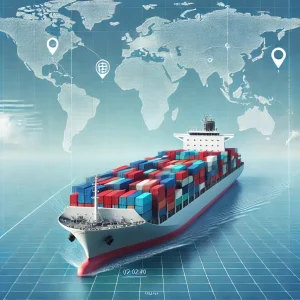The Importance of Cargo Tracking in Maritime Logistics
The global maritime industry serves as the backbone of international trade, enabling the movement of goods across continents. In this dynamic environment, efficient cargo tracking has emerged as a critical element, enhancing transparency, operational efficiency, and customer satisfaction. Modern cargo tracking technologies such as the Internet of Things (IoT), blockchain, and advanced data analytics are revolutionizing maritime logistics, offering real-time updates and reducing supply chain uncertainties. This article explores the technologies driving cargo tracking and their profound impact on the shipping industry.
Cargo tracking plays a vital role in managing the complexities of international shipping. Accurate tracking systems ensure visibility throughout the supply chain, enabling stakeholders to monitor shipments, reduce transit times, and mitigate risks. The benefits of effective cargo tracking include:
- Enhanced Transparency: Real-time data sharing improves transparency between shipping companies, freight forwarders, and customers.
- Operational Efficiency: Automation and precise tracking reduce delays, streamline logistics, and minimize cargo mismanagement.
- Risk Mitigation: Tracking systems help identify potential delays, cargo damage, or theft, enabling proactive responses.
- Customer Satisfaction: Providing customers with live updates enhances trust and fosters long-term business relationships.
Technologies Driving Cargo Tracking in Maritime Shipping
The development of cargo tracking technologies has reshaped maritime logistics, enabling seamless information flow from departure to destination.
1. The Internet of Things (IoT)
IoT involves connecting physical devices, such as cargo containers and ships, to the internet through sensors and communication modules. These devices collect and transmit real-time data, providing valuable insights into cargo conditions and locations. Examples of IoT Applications:
- Smart Containers: Equipped with GPS, temperature, and humidity sensors to track perishable goods.
- Predictive Maintenance: Sensors monitor ship machinery, reducing unexpected breakdowns.
- Fleet Management: Real-time ship tracking optimizes fleet deployment and reduces fuel consumption.
Case Study: Maersk’s Remote Container Management (RCM) platform tracks refrigerated containers, ensuring cargo quality while reducing operational costs.
2. Blockchain Technology
Blockchain offers a decentralized and immutable ledger for secure cargo tracking. It records every transaction and event in the shipping process, ensuring data integrity and reducing fraud. Key Benefits:
- Data Security: Prevents data tampering and ensures accurate cargo records.
- Smart Contracts: Automates processes like cargo release upon payment verification.
- Transparency: All supply chain participants can access a shared, trustworthy record.
Example: IBM and Maersk’s TradeLens platform uses blockchain to digitize shipping documents, reducing paperwork and enhancing supply chain visibility.
3. GPS and Satellite Tracking
Global Positioning System (GPS) and satellite-based tracking systems enable precise cargo location monitoring. These technologies provide real-time data on ship positions and estimated arrival times. Benefits:
- Improved route planning and fuel efficiency.
- Accurate ETA updates for customers.
- Enhanced maritime security through anti-piracy monitoring.
Example: Global shipping lines like MSC and Hapag-Lloyd use satellite tracking to ensure timely cargo deliveries.
4. Big Data and Analytics
Advanced data analytics play a crucial role in predicting cargo movement patterns, optimizing shipping routes, and managing fleet performance. Data-driven insights help shipping companies enhance operational efficiency and reduce costs. Applications:
- Demand Forecasting: Analyzing past data to predict shipping volumes.
- Weather Routing: Using meteorological data to avoid adverse weather conditions.
- Performance Monitoring: Tracking fuel consumption and engine efficiency.
Example: DHL’s SmartSensor technology collects and analyzes cargo data, offering real-time visibility into shipment conditions.
Benefits and Challenges in Modern Cargo Tracking Systems
Implementing advanced cargo tracking systems transforms maritime logistics by ensuring timely deliveries, reducing operational risks, and enhancing service quality.
- End-to-End Visibility: Stakeholders can monitor cargo from origin to destination, improving decision-making.
- Supply Chain Optimization: Accurate tracking data supports better inventory management and reduces stockouts.
- Compliance and Security: Real-time monitoring ensures compliance with international shipping regulations.
- Cost Efficiency: Reduced delays and optimized logistics lower operational costs.
- Enhanced Customer Experience: Transparent communication builds customer trust and loyalty.
Despite its numerous advantages, cargo tracking in maritime logistics faces several challenges, including:
- Data Integration Issues: Integrating data from various sources requires standardized formats and robust IT infrastructure.
- Cybersecurity Risks: Increased digitalization exposes shipping companies to data breaches and cyberattacks.
- High Implementation Costs: Investing in advanced cargo tracking technologies can be costly, especially for small and medium-sized enterprises (SMEs).
- Global Regulatory Compliance: Different international shipping regulations complicate cargo tracking standardization.
Future Trends in Cargo Tracking for Ships
The future of cargo tracking lies in the continued advancement of technologies such as artificial intelligence (AI), machine learning, and autonomous shipping.
- AI-Powered Predictive Analytics: AI-driven tools will enhance cargo movement forecasting and logistics planning.
- Autonomous Ships: Self-navigating vessels equipped with advanced tracking systems could redefine maritime transportation.
- Blockchain Integration Expansion: Wider adoption of blockchain will streamline cross-border trade and reduce administrative overhead.
- Green Shipping Technologies: Tracking systems will help optimize shipping routes, reducing fuel consumption and environmental impact.
Cargo tracking has become indispensable in modern maritime logistics, enabling transparency, operational efficiency, and customer satisfaction. Technologies such as IoT, blockchain, GPS, and data analytics continue to redefine cargo management, making global shipping more efficient and secure. By embracing these innovations, the maritime industry can navigate complex supply chains with enhanced precision and reduced risk, ensuring smoother, more reliable cargo deliveries.


One thought on “Cargo Tracking for Ships: Enhancing Transparency and Efficiency”